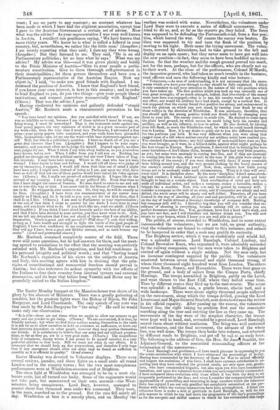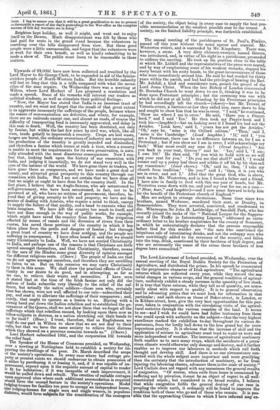The Easter Monday banquet at the Mansion-house was shorn of
its glory by the absence of Ministers. There was a goodly gathering of notables, but the greatest lights were the Bishop of Ripon, Sir John Burgoyne, and Lord Clanricarde. The only speech of any note was that made by Sir John Burgoyne for " the army." He said he would make only one observation :
"It is this—these are not times when we ought to allow our armour to get rusty and our powder to get damp. (Cheers.) We are surrounded, it is true, by friendly nations ; but when we find those nations arming themselves to the teeth it is not for us to allow ourselves to hold an existence on sufferance, or leave our best interests dependent on other people, however they may profess themselves our friends. It is satisfactory to believe that our army and our military prepara- tions, so far as they go, are in a very good state. (Cheers.) The magnificent body of volunteers, among whom I am proud to be myself enrolled, is a very powerful addition to that body. Still we must not relax in our efforts. It is necessary that we should keep up. due preparations, and therefore I only hope that if any emergency should arise our army may be found as sufficient in quantity as it is efficient in quality." (Loud cheers.)
Easter Monday was devoted to Volunteer displays. There were several reviews, parades, and sham fights on a small scale all round London and in the country towns ; but the two most conspicuous performances were at Wimbledon-common and at Brighton.
The sham fight at Wimbledon was arranged to be on a most ela- borate scale, but all turned out badly. Some of the regiments would not take part, but manoeuvred on their own account—the West- minsters lacing conspicuous. Lord Bury, however, managed to muster about four thousand men under this command. They were, in the main, marched on to the ground. But the rain fell nearly all day. Wimbledon at best is a marshy place, and on Monday the surface was soaked with water. Nevertheless, the volunteers under Lord Bury were to execute a series of difficult manoeuvres. They tried to do so, and, so far as the reports go, they failed. The force was supposed to be defending the Portsmouth-road, from a fine posi- tion, which barred the way. Of course the enemy was beaten. He then was supposed to try and turn the flank of the position by moving to his right. Here came the trying movement. The volun- teers, covered by skirmishers, had to take ground to the left and deploy on an open space; but they never seem to have got well into,
the new position—in fact, they seem to have been huddled up in con- fusion. So that the weather and the rough ground proved too much, not for the men, perhaps, but for the officers, who are clearly not up to their work. At the close .of the performance, Colonel M'M urdo, the inspector-general, who had taken so much trouble in the business, read officers and men the following kindly and wise lecture :
" Volunteers,—As men of understanding, it is not necessary that the move- ments which you have gone through to-day should be fully explained. I think it only necessary to call your attention to the nature of the two positions which you have taken up. The first position which you took up was naturally one of very great strength; of so much strength, indeed, that two-thirds of-the enemy must have been non-engaged—that is to say, his cavalry would not have had any effect, nor would his artillery have had much, except by a vertical fire. It was supposed that the enemy found that position too strong, and endeavoured* to reach the plateau on which you now stand, by turning your flank by one of those valleys in the direction of Wimbledon. It was necessary, therefore, that you should quit the strong position which you firmly held by changing your front to your left. The enemy desired to evade this. He desired to come upon the plain level ground, by which means he could bring both his cavalry and artillery, as well as his infantry, to bear in action. He also desired, by turning your left flank, to reach the Wimbledon-road, by which he could march through, you to London. Now, it is my desire to point out to you the difference between the two positions you held. It was very different when you were along that rugged crest of a bill where neither cavalry nor artillery could have reached you. You checked the enemy there ; any bold number of men could have done so; hut you were brought, as it were, to a billiard-table, against what might perhaps be the best troops in Europe. Now, gentlemen, I observed that in forming line here some battalions—I don't blame them, because they have had very little practice, as yet; but some were unsteady in coming into line, and if they are unsteady- in coming into line to-day, what would be the case if this plain were swept by the artillery of the enemy ; if you were choking with dust; if many comrades were falling around you, and the very ground shaking by the heavy masses of the enemy's cavalry charging you ? Now, then, consider how liable young troops are to be unsteady under such circumstances. What is it that will over- come this? It is discipline alone. By the term discipline,' I don't mean check- ing bad conduct; I mean habitual union and combination of mind and body- brought to bear on a certain object. That combination of mind and body sets aside all individual action, and makes a company, makes a battalion, makes a brigade like a machine. Now, this can only be gained by company drill. I consider a company as the unit of an army, and if companies are steady and well drilled, the whole army will be steady and well drilled. Therefore, all you have learned in the way of shooting, all your zeal and patriotism, will be of no avail on the day of battle without a thorough knowledge of company drill. Nothing brit company drill will do. I therefore beg that you will not consider that ex.. ceillence of shooting is everything, because nothing will do unless you are perfect formators under fire. You, gentlemen, have had a bard day's work, and yeti have wet feet, and I will therefore not further detain you. You will now return to your homes, which I know you are well able to protect."
The public, of course, crowded to Wimbledon, and to some extent incommoded the volunteers; but we are told, on great authority, that the volunteers are bound to submit to this nuisance, and submit to be hampered in order that a mob may gratify its curiosity. The Brighton review, which it was so confidently said would fail, was a splendid success. Lord Ranelagh, Colonel Lindsay, and Colonel Brownlow Knox, who organized it, were admirably seconded
by the railway companies, and the men were taken to Brighton and carried off again without a single mishap. Not the men only, but an immense contingent supplied by the public. The volunteers mustered between seven thousand and eight thousand strong, of whom three thousand eight hundred went from London. The others came from,Kent, Sussex, and Hampshire. There were four guns on the ground, and a bodS, of sailors from the Cinque Ports, chiefly Hastings. The troops assembled in Brighton, partly on the Level, and went thence to the East Cliff, where they halted some time- Then by different routes they filed up to the race-course. The scene was splendid: a brilliant sun, a gentle breeze, elastic turf, and a wide landscape. There were about eighty thousand people collected on the race-course, along which the troops defiled, passing the Lord Lieutenant and Major-General Scarlett, sent downto witness the review in his official capacity. After passing up the course, the volunteers formed line, the right taking up position first and the remainder marching along the rear and entering the line as they came up. The movements of the day were of the simplest character, the troops were kept well in hand, and, seconded by a good staff, Lord Ranelagh moved them about without confusion. The firing was well sustained and continuous, and the final movement, the advance of the whole line, was well done., The troops then broke into column, and returned by different roads to Brighton, and Oftot off by rail at an early hOur. The following is the address of Gen. the Hon. Sir Jam % Scarlett, the Adjutant-General, to the assembled commanding officers at the termination of the manoeuvres : " Lord Ranelagh and gentlemen,—I have much pleasure in expressing to you the entire satisfaction with which I have witnessed the proceedings of to-day. Having been commanded by the Secretary of State for War to attend officially and inspect the evolutions of this force, I shall have extreme satisfaction in re- porting that they have reflected the greatest credit, not only upon you, gentle- men, who have commanded brigades, but also upon you who have commanded battalions, and upon the volunteer forces which you have respectiCely commanded. I have compared these evolutions with those which it has been my duty to see frequently performed by the line; and when I consider the comparatively limited opportunities of assembling and exercising in large numbers which the volunteer force has enjoyed I am not only gratified but completely astonished at the per- fection with which the various manceuvres have been accomplished. I think the volunteer force is under a debt of gratitude to Lord Ranelagh, as well for the able manner in which he has laid down the programme of the day's proceedings as for the energetic and skilful manner in which he has commanded this large
force. I beg to assure you that it will be a great gratification to me to present so favourable a report of the day's proceedings to the War-office as the complete success of this day warrants me in doing."
Brighton kept holiday, as well it might, and went out to enjoy itself on the Downs, Much disappointment was felt by those who had paid for seats in the grand stand because the volunteers in marching over the hills disappeared from view. But these good people were a little unreasonable, and forgot that the volunteers were at work for their own benefit, as well as kindly submitting to be made a show of. The public must learn to be reasonable in these matters.































 Previous page
Previous page